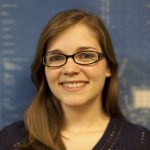
This Forum Update was provided by Samantha Norling, Archivist for the Indianapolis Museum of Art.
As one member of the inaugural group of Museum Cross-Pollinator Fellows, the Digital Library Federation generously covered my travel and registration expenses for the DLF Forum, making it possible for me to attend the conference for the first time. By creating this new fellowship, the DLF has sent a clear message that there is value in expanding conversations around digital libraries to include the broader digital collections landscape—a landscape that encompasses all institutions and professionals that are actively engaged in making our digital and digitized cultural heritage available online.
But despite the clear vote of confidence that the DLF made in me by investing in my attendance, I still found myself second-guessing the value of my potential contributions as I sat in the Grand Ballroom of the Georgia Tech Hotel & Conference Center on the first morning. As Archivist at the Indianapolis Museum of Art, I manage over 130 years of institutional records—physical, born-digital, and digitized. Digital collections work has been a major component of my first year in this new position, as I am currently managing the completion of a 3-year, NEH-funded digitization grant. While the majority of my time at work is spent digitizing material and creating digital object records with rich metadata in preparation for the release of this collection in the spring of 2015, I am fortunate to have a group of digital strategists, developers, and designers from the in-house IMA Lab who handle what I considered to be “the tech side” of the project.
And therein lies the rub.
Though I didn’t realize it before attending the DLF Forum, I had perceived—and therefore created—a divide between myself and the people who I saw as the true practitioners (read: doers) of digital collections work: the professionals building the systems and shaping end-user experience through programming and design.
So while I knew that I had the knowledge and vocabulary to understand the conversations that I expected to encounter at the Form, I had lower expectations of my ability to make meaningful contributions to the DLF community. That is, until I actually attended the DLF Forum.
We at the DLF Forum—unlike so many specialized tech and academic conferences—are at once a gathering of generalists and of experts.
This statement, made by Bethany Nowviskie during the Welcome and Keynote Address, completely changed the approach that I would take to my first DLF Forum. Bethany not only acknowledged that attendees came to the Forum with varying levels of experience and knowledge of the topics that were going to be presented and discussed, but she also encouraged us to embrace this variety and to recognize that this is one of the Forum’s greatest strengths.
I’m pretty sure you’ll feel that balance as you move from session to session this week, hopefully finding conversations that deepen your own considerable expertise and allow you to share it, and also those that happily expose your ignorance…
With a deeper understanding and awareness of my roles as a generalist within the digital library world and as an expert on archival principles and practices, I abandoned many of my reservations and dove head-first into my first DLF Forum. I kept Bethany’s words in mind throughout the rest of the conference, and found them to be completely true—having a balance between generalists and experts in every aspect of digital collections work can lead to some amazing outcomes. The presentations were a testament to that fact. I was encouraged to hear from the professionals on “the tech side” of digital libraries about the valuable role that archivists and librarians had played in the development and success of their projects. And I was even more encouraged to see that many of these librarians and archivists were in attendance and presenting on their work in the realm of digital collections.
I’m not sure when or if I’ll be able to attend another DLF Forum, but I certainly hope that more professionals outside of the traditional digital library roles will be encouraged and supported to attend. The creation of the Museum Cross-Pollinator Fellowship is a great first step towards breaking down the perceived barriers between the academia-centric digital library realm and the broader digital collections landscape that also encompasses museums, archives, historical societies, and a variety of other organizations. There are many benefits of bringing together all types of digital library practitioners—both generalists and experts—in the setting of the DLF Forum, but there are even more benefits to be derived from expanding the definition of a “digital library” to include the full spectrum of digital cultural heritage collections.
